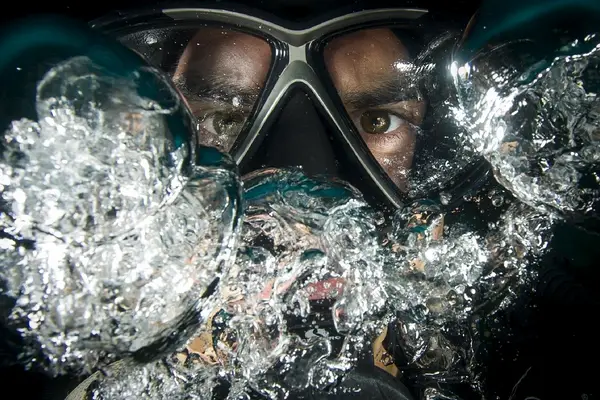
How to stay calm while learning to scuba dive as a beginner
Learning to scuba dive should be fun but many have anxiety when learning to scuba diving. For many going underwater can create anxiety. The joy and fun of this great hobby and sport can be spoilt for some before it even begins.
What helps with anxiety when learning to scuba dive?
- Find the right scuba instructor at the outset.
- Take the training at your pace.
- Find easy dives to slowly build your skill levels and experience.
- Always dive within your skill level.
- Perfect and practice your underwater skills.
- Be honest with your dive buddy and dive master.
- Distract yourself underwater.
The best way to do more diving is to book yourself on a scuba diving liveaboard. You can check the latest and best deals on liveaboards using the following window:
Let’s take a look at each of these in a bit more detail if you’re nervous about scuba diving.
1. When you’re learning to dive for the first time find the right scuba instructor at the outset
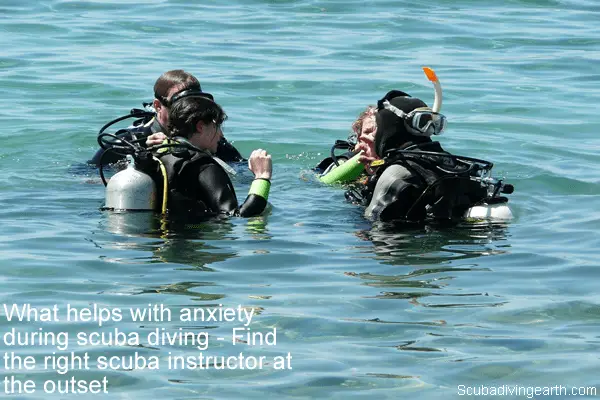
If you’re keen to go scuba diving but have anxiety when learning to scuba dive, if you find the right scuba instructor this can make all the difference. I’ve come across those who had a great instructor to teach them to dive.
But I’ve also come across those who had the nightmare instructor as well.
More Reading: What is It Like Scuba Diving For The First Time (Is Scuba Diving Scary?)
The right scuba instructor is about you feeling comfortable with that person. It’s about finding someone who will teach you safely. You need to have full confidence in your diving instructor.
A good scuba instructor will recognise your anxiety and will have patience and take everything at your pace. They won’t rush you and if you struggle with any section of the learning, they’ll take time until you grasp the skill. This is extremely important if you’re feeling anxious about scuba diving.
When I instructed scuba divers at a BSAC club, I would always spend the time to make sure my students grasped each skill I taught. This was especially true of mask clearing.
More Reading: How To Clear A Scuba Diving Mask (4 Simple Steps To Clear A Mask)
Mask clearing of all the skills taught in scuba proved to be the most difficult for many. However, with a bit of patience and by taking it slowly, most, if not all, students grasped the concept in the end.
The other important factor to consider about having a great scuba diving instructor is; if you’ve been taught well, you are less likely have anxiety with scuba diving in the first place.
2. Take the scuba diving training at your pace
Taking things slowly is a progression of the previous point. This is particularly true if you’re an anxious diver. This is true of the very first learning stages, as it is as you progress to an Open Water Diver or equivalent and above.
I’ve always said to all my scuba students; build your experience slowly and at your pace. There needn’t be a rush and it’s certainly not a race or competition. This would only exacerbate any anxiousness.
You will always get the macho man who has to go the deepest and take the next best scuba diving course. But why I ask? Scuba diving is for fun and it’s about taking things slowly and safely.
More Reading: 107 Top Scuba Diving Tips For Beginners (Must Know Techniques)
I’ve always maintained that beginner scuba divers should do a minimum of 20 dives before progressing to the next level of diving. This is especially true if you are slightly anxious.
Having said that about beginner scuba divers, experienced divers can also get anxious too. This can happen at depths of 30-plus metres (100+ feet) when nitrogen narcosis can kick in. This happened to me at 47 metres down and was scary I have to say.
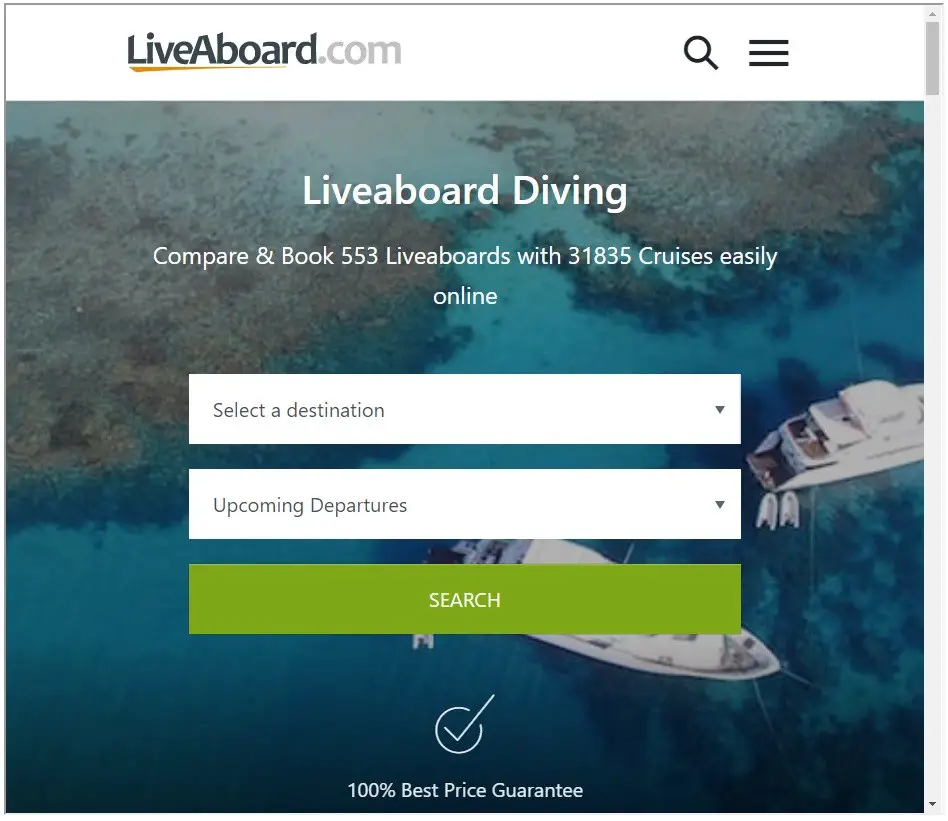
3. Find easy dives to slowly build your skill levels and experience
Once you’ve learned to scuba dive, but if you still feel anxious about diving, you should slowly build-up your confidence. This is best done by finding easy and shallow dives.
Dive with a dive buddy that is experienced and competent and someone who you trust.
Make sure you dive with a dive buddy who will look after you and a person who understands your scuba anxiety. But more importantly, dive with someone who isn’t going to push you, but instead will take everything at your pace.
More Reading: How do I get a dive buddy? (5 easy ways to find a dive buddy)
Always remember that the deeper the dive, the more likely you’re going to suffer from anxiety. The greater the depth of water that’s above you on your on your dive, the more likely you’re going to stress about it and suffer from anxiety.
So until you’re comfortable diving in shallow water (when I say shallow, I mean sub 20 metres (66 feet)), do as many dives as you can until you are comfortable at that depth.
More Reading: The best liveaboard diving for beginners (10 top liveaboard destinations)
4. Always dive within your skill level
As already mentioned, you should build your scuba experience slowly. The same goes for your skills. A slow progression will give you confidence in your abilities and will help to alleviate any anxiety.
You should also always dive within your skill level, which includes your maximum depth. For example, if you are a PADI Open Water Diver, or BSAC/NAUI equivalent, never dive beyond the prescribed 18-20 metres (60-66 feet) until you’ve taken the next diver certification level.
But at each certification level do plenty of diving in order to master your skills and to gain experience to keep you safe. But also, don’t do a dive that requires a new skill until you’ve been taught the new skill. For example drift diving.
The first time you dive with your newly acquired skill, dive with a diver who is experienced in that skill.
Whilst a very mild drift dive isn’t overly dangerous, you are best to take the necessary course to understand the safety aspects of a drift dive before you dive in a current.
For example, drift diving provides one of the highest risks of getting separated from your dive buddy. This is especially true in low-viz water. Understand how to safely dive in a drift dive first to avoid the stress of getting split up from your dive buddy.
More Reading: What is Drift Diving (+20 Drift Diving Tips)
Other types of dive to be cautious about until you’ve been taught the necessary skills include, night diving, deep diving, wreck penetration diving, cave diving and ice diving.
5. Perfect and practice your underwater skills as a beginner diver
Once you’ve learned a new skill, you should spend time practicing. One of the first important skills you’ll learn is buoyancy control. Many newbie scuba divers get quite anxious about their buoyancy control.
Achieving buoyancy control is important for many things when scuba diving. Not least for protecting coral reefs. You use your buoyancy to keep a safe distance from the reef, instead of bumping into it and destroying the reef.
More Reading: How To Achieve Neutral Buoyancy Scuba Diving (Made Easy)
But as you gain more experience, you’ll be able to dive where the sea bed is deeper than the depth of your dive.
For example, there are many great dives on pinnacles that rise up from the ocean depths. These pinnacle dives can be in waters depths in excess of 1,000 metres (3,281 feet) deep.
Don’t sink to the sea bed by controlling your buoyancy!
What helps with anxiety during scuba diving with 1,000 metres below you would be to have already mastered your buoyancy on dives where you’re diving along the bottom in shallow depths.
In order to avoid sinking to the bottom on a dive of this type, you need to have mastered your buoyancy control using your buoyancy control device (BCD).
Conserving your air to extend your dives
Another key reason to master your buoyancy control is to help you conserve your air when diving.
Master your buoyancy control and you will conserve your air. But by gaining confidence when diving (and buoyancy control is a big part of this) you’ll breath less in any event.
If you’re anxious whilst scuba diving, you’ll be breathing more heavily. Reduce your anxiety levels, stay calm and enjoy your dive and you’ll use less of your air, which means your dive times will be extended.
By practicing all your skills will give you more confidence. In turn this will help you with your anxiety when scuba diving and will help you to enjoy this wonderful sport even more.
More Reading: 28 Tips To Conserve Air When Scuba Diving (How To Extend Your Dive Time Safely)
6. Be honest about your anxiety with your dive buddy and dive master
To conquer your diving anxiety may take time. But it may also take you being honest with yourself too. But also to be honest with those who you are scuba diving alongside.
By letting your dive master or dive buddy know that you are suffering from a bit of anxiety will help them to understand your problem. This way, they can adapt how they dive and how they interact with you.
If I’m diving with anyone who’s feeling anxious, I take things much more slowly, be it the descent, the dive itself or whatever is going on. I always pay that little but more attention to anyone who I know is anxious, thereby helping to comfort them on the dive if they need it.
It’s okay to cancel a dive
Always keep in mind one of the golden rules of scuba diving safety, it’s always okay to cancel a dive if you’re not feeling it for whatever reason. Safety comes first; always!
If you’re uncomfortable about any aspect of the dive, be it the depth, how you’re feeling or if something just doesn’t feel right, there’s always another day when you can dive. It’s better to be safe than sorry.
7. Distract yourself underwater will help with any anxiety on a dive
I mentioned above that I suffered from an anxiety or panic attack underwater at 47 metres down.
This was pretty scary at the time and a 47 metre ascent whilst hyperventilating is a long way up and takes a long time. I worried that I was going to run out of air, among other things. Although the fog cleared at about 25 metres (82 feet).
This dive affected me for quite some time afterwards. The fact that this happened, I put it down to my mindset at the time. My wife had just left me and my life had been torn apart.
This didn’t help with my mindset when nitrogen narcosis kicked in! Although at the time I wasn’t aware that it would affect me in this way. It was only when I reached the bottom, which was 47 metres underwater, that I began to panic!
So anxiety when you’re scuba diving may not just be about the dive itself. If you’re feeling anxious, take a look at what’s going on in your life at the time too.
Change your mindset
Any way, the reason for mentioning this event is not as a sob story, but to explain how I had to change my mindset in order to enjoy diving once more.
I found I’d get anxious before every dive, even if it was to just 20 metres (66 feet). Or if not before the dive, at some point during the dive.
I had to resolve my anxiety problem, and apart from seeking help (see below), when anxiety began to trouble me on a dive, I’d distract myself. If I found myself starting to feel anxious, I’d look for something. I’d go out of my way to further explore crevices and corals to distract my mind.
This worked and it meant that I enjoyed the dive, rather than spend the the whole dive worrying about equipment failure or the depth of water above me etc.
By distracting my mind away from these anxious feelings, my breathing rate would slow down and my heart would stop racing too.
What may make you laugh is that if ever I was on a dive with sharks, my anxious feelings towards scuba diving completely disappeared. The sharks were my distraction! How bizarre is that, but then I love to scuba dive with sharks.
More Reading: Is It Dangerous To Scuba Dive With Sharks? (Will I Be Eaten?)
I hope you enjoyed this article about what helps with anxiety when learning to scuba dive
I’d love to hear from you. Tell us about your adventures of diving and snorkelling. Please use the comments section below. Please also share your photos. Either from your underwater cameras or videos from your waterproof go-pro’s!
If this article hasn’t answered all of your questions. If you have more questions either about snorkelling or scuba diving (or specifically about what helps with anxiety when learning to scuba dive), please comment below with your questions.
There will also be many more articles about scuba and scuba diving safety tips (and on snorkelling too) for you to read and learn about this fabulous sport.
Have fun and be safe!



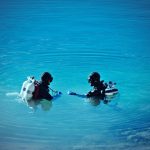
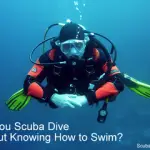
Thanks for the tips. I did my PADI 28 years ago and dived a lot on the Great Barrier Reef and Coral sea. I haven’t dived for more than 20 years and did a refresher on the weekend. It did not go well. In the pool I was fine with mask clearing etc but when we went into the sea off the beach in only 2 metres of water when the difficulties started. I admit I was a little nervous to begin with but that turned to anxiety pretty quickly. My instructor kept touching my arm, my leg, holding my air buoyancy control and it made me feel trapped and not in control. When he was behind me and I couldn’t see where he was I felt like he was pushing me down. In reality he was probably doing his best to guide me but I just hated it. I would push his hand off me, or try to get back my air control. I will need to do a few more sessions in the pool and shallow dives to feel confident again and take it much slower with an instructor who understands my issues with control.
Hello Michelle,
Thank you for your comment and for sharing your experience of going back in the water after a long time. 20 years is a long time to not going diving, and you did the right thing by doing a refresher.
What may help is if I can I ask if when you were diving 20 years ago, were you a nervous diver then? When you first started diving and perhaps your first time in the water, were you apprehensive and nervous? If you were, then you are probably experiencing these same feelings again, as you are effectively starting over again.
But what I am hoping is that as you progressed with your experience with diving back then 20 years ago, did you get to a point where you loved scuba diving and you weren’t nervous? If you were then great, because you’ll be able to get to this point again.
But what I’d love you to do is to think about your best dive you did, your best experience, what you saw, who you were with and focus on what you loved about the dive.
Keep this great diving experience in your mind each night before you go to bed, and every morning when you first wake up. But close your eyes for a few moments and visualise your best diving experience when everything went well, when you were confident and enjoying the dive. This will work much better if when you have your eyes closed and you re-experience your best dive is that you tap into the feelings you had at the time, like the temperature of the water, what you saw and how this made you feel…essentially keep re-living this great experience, and this will help you to build your confidence back up.
Do this for a couple of weeks before you actually go diving. But then when you finally go diving again, focus on this great experience (and remember at this point you will have re-lived it many times in your head), focus on the good feelings.
Also, what will help is if you also think forward about after your dive. Think about the positive things you’ll be talking to your friends about. Also, think about coming back here to post a positive comment about what a great dive you had. Think about how much you love diving and this should help you to have a lovely experience.
I hope you come back to read this, and I would also like to hear back when you’ve done your next dive, and the next one when you are loving it again.
Take care and “HAPPY DIVING”, Russell